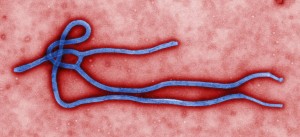The symptoms of Ebola are terrifying. In its later stages it leads to internal and external hemorrhaging—this includes bleeding from the eyes and ears. It can have a death rate of up to 90% (although the current outbreak kills about half of its victims). In addition, there’s no vaccine against it and no particularly effective treatment. Scary, right?

It even LOOKS sinister… but most viruses do. (Source: Wikipedia)
It even LOOKS sinister… but most viruses do. (Source: Wikipedia)
Although the disease has certainly takes a terrible toll upon infection, in a transmission-sense the disease is rather mild. NPR’s Morning Edition interviewed Stephen Morse, a virologist at Columbia University, about his opinion on Ebola’s potential to cause a worldwide epidemic. His response: “Luckily for us, unlike the movies, it does not spread like wildfire, and in fact does not even spread the way the flu does. It’s not that easy to catch… to transmit Ebola, it takes way more than a sneeze, or even a cough. You need direct contact with an infected person’s bodily fluid, like their blood or vomit.” Although mutations (around 300) have been shown to be occurring in the current outbreak strain, these have not manifested a significant physiological difference and, researchers agree, will likely not for a good amount of time.
Further, although the CDC and other public health authorities clearly recognize the threat from Ebola and are taking steps to prepare for a contingency, neither seem too concerned about a pandemic on US soil. Models show a slim chance of Ebola actually reaching US shores. Further, with a straightforward response, the disease would be readily containable.
Ebola’s mild transmission characteristics raise the question: why is the current outbreak so bad?
If the cause does not rest entirely in the disease itself, other factors must be at play. Of course, West Africa’s poverty and poor infrastructure contribute to the situation’s direness. But more nuanced and surprising factors are at play, too. In the interest of readability through brevity, we’ll probe this question next week. Stay tuned.
